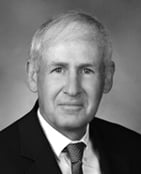BOARD PULSE FEBRUARY 2018 – Joe Dyer
Board Pulse – Joe Dyer

In 2010, Joe Dyer was reading the MSBA Bar Bulletin when he came across an advertisement seeking board members for the Pro Bono Resource Center of Maryland. To some, he may have seemed an unlikely candidate, having mostly practiced in the fields of government contracts, export controls, and international law.
Dyer is, however, a lawyer dedicated to equal justice. A longstanding member of the Mid-Atlantic legal community with Maryland roots: he graduated cum laude from University of Maryland’s School of Law in 1979 and chaired the Maryland State Bar Association’s International Law Committee from 2002 to 2003.
A few years after joining Washington, D.C. firm Seyfarth Shaw in 1988, he applied his interest in human rights law and past work with Amnesty International to joining his firm’s pro bono committee, branching out into more pro bono legal work, and representing asylum seekers through Human Rights First.
So, when Dyer saw the opportunity to join PBRC’s Board of Directors, he applied. After years of unwavering dedication, including programmatic guidance, pro bono engagement, financial advice, and board service, he now is President.
Q: How do you view PBRC, and pro bono work more generally?
A: I think everyone who’s in a position to give back to the community should. Being a nation of laws, lawyers have special capability to ensure equal access to legal representation. I was impressed as I got involved with PBRC – I think they are unique in that they are not focused on one particular community. What organizations should seek to do, and what I believe PBRC does very well, is try to stay ahead of the curve in terms of legal needs, partner with a large number of organizations to provide training and clinics, be extremely involved in advocating for pro bono, and provide substantive assistance in various areas.
Q: What do you believe are the biggest challenges facing clients seeking pro bono help?
A: As always, a lack of lawyers providing pro bono services. PBRC was formed to take on the responsibility of pro bono work. In Maryland, the code of professional responsibility requires pro bono services, but no hourly requirement. I think a lot of attorneys would be willing to do pro bono work. The biggest reason for the lack is that [lawyers] simply are not presented with reasonable (in the sense that it’s an area of law that they are either familiar with or can find mentors for, or in the sense of the hours required) options. To that end, however, PBRC does arrange clinics, training, and mentors.
Q: So, you’re a partner in Seyfarth Shaw’s D.C. office and a member of its National Whistleblower Team. Can you tell me a little more about the latter?
A: A lot of the whistleblower work is handling contractors defrauding government offices.
Q: That sounds like a lot of paperwork on top of everything else you’ve got going on. How do you manage to fit us in on top of everything else?
A: You find the time to do the things you think are important – I don’t have a TV.
